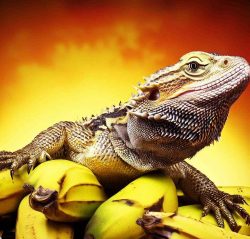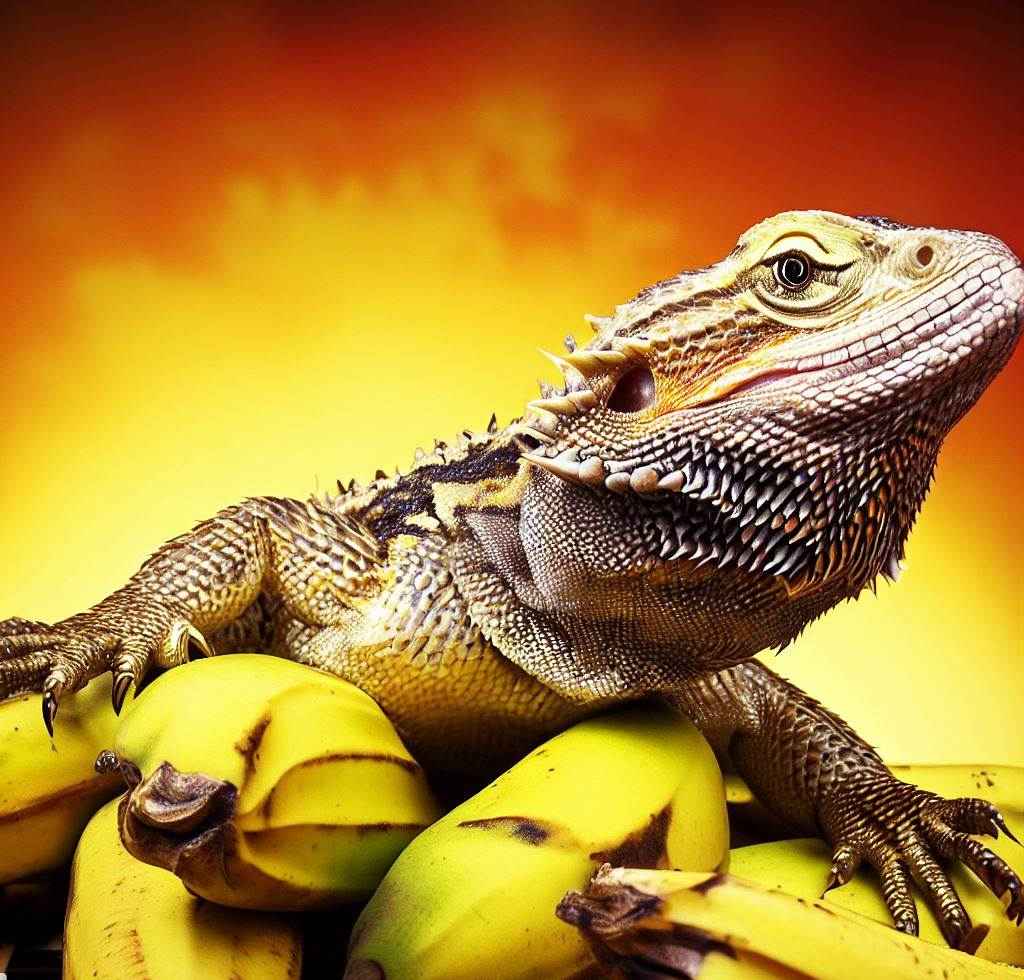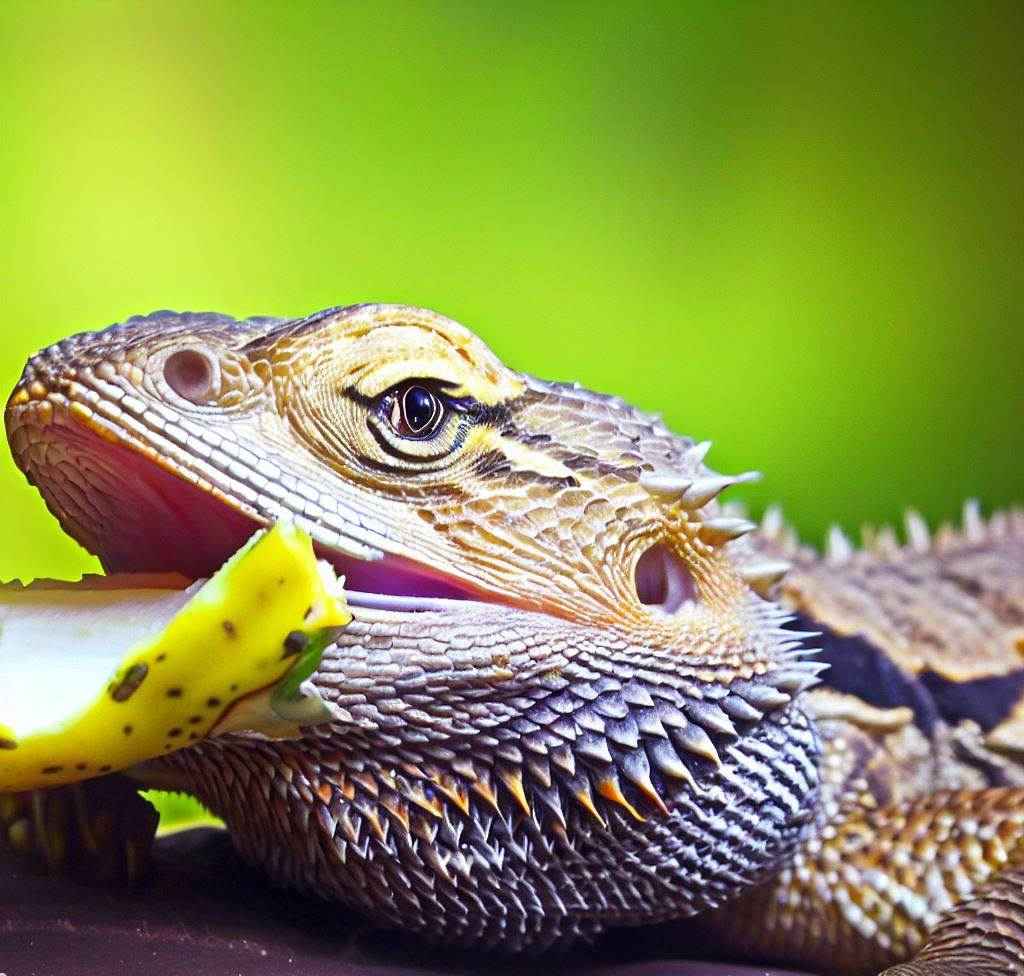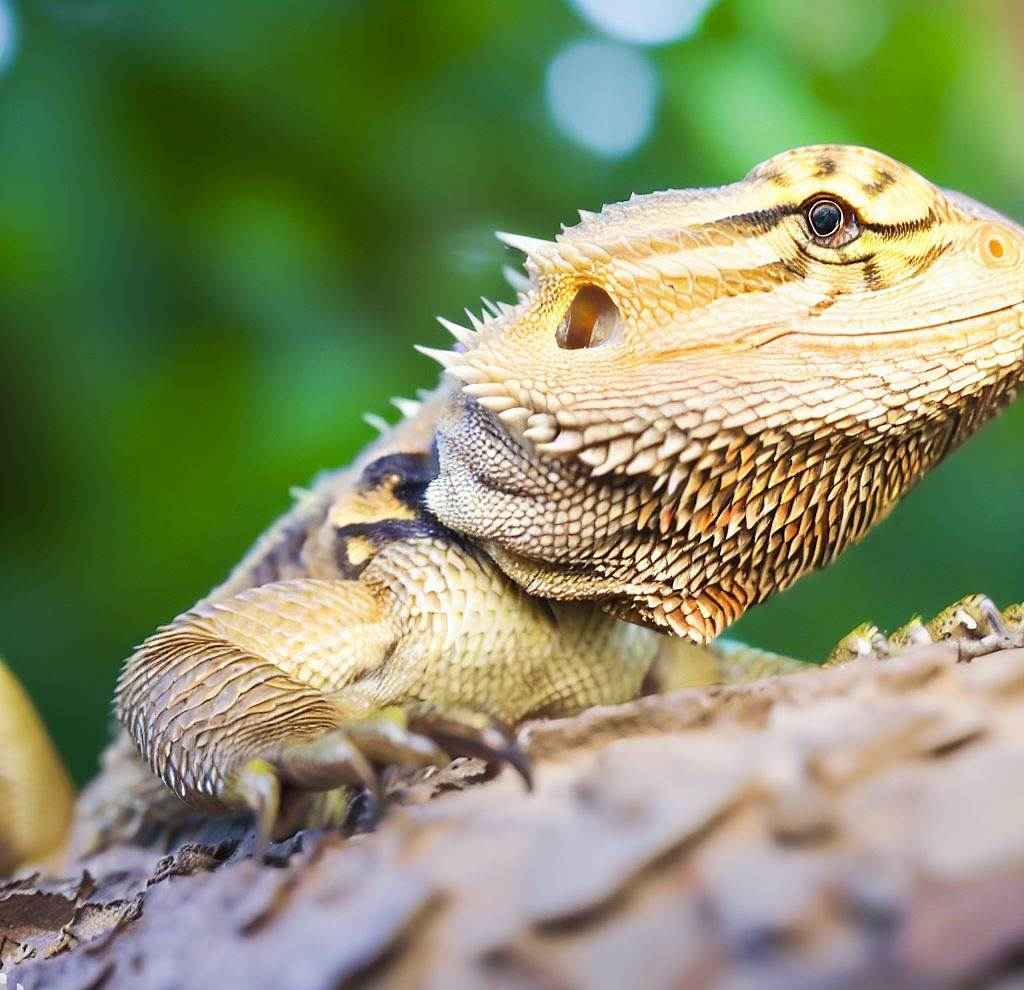How Can A Bearded Dragon Eat Bananas?
The answer to question Can a bearded dragon eat bananas? Yes, bearded dragons can indeed eat bananas. These reptiles exhibit a diverse range of dietary requirements, predominantly encompassing insects and vegetables. While bananas can introduce a hint of diversity, their elevated sugar content renders them a suboptimal choice for regular ingestion.
To seamlessly incorporate bananas into your bearded dragon’s dietary plan, adhere to these guidelines: Meticulously section a minute, the bite-sized fragment of banana, extending the offering on a monthly basis, limited to once or twice. Safeguard against bananas encroaching upon the indispensable elements of their diet. Stay vigilant for any untoward reactions or shifts in demeanor your pet may manifest after experimenting with novel food items.
This is essential to recollect that while a minuscule taste of banana can present an enjoyable treat, the crux lies in preserving a harmonized and nourishing diet, serving as a cornerstone for your bearded dragon’s overall well-being.
Introduction:
Are you the happy owner of a bearded dragon who wants to add some diversity to their diet? While these reptiles have a wide variety of eating habits, it is vital that their meals be both healthy and safe. “Can a bearded dragon eat bananas?” is a commonly asked question. We are going to delve into the realm of bearded dragon feeding in this post and offer you all the knowledge you need.
Bananas As A Diet Of Bearded Dragon:
However, it is important to note that the occasional consumption of bananas won’t necessarily harm your bearded dragon. If you choose to introduce bananas into their diet make sure to follow these guidelines:
Portion Control:
Cut a small piece of banana into manageable portions. A bite-sized amount is sufficient for your bearded dragon.
Frequency:
Limit banana consumption to once or twice a month. This ensures that your pet receives the benefits of variety without compromising their health.
Balanced Diet:
The majority of their diet should consist of appropriately sized insects and nutrient-rich vegetables. Bananas should not replace these essential components.
Observation:
Watch your bearded dragon for any adverse reactions after consuming a small piece of banana. If you notice any digestive issues or changes in behavior, consult a veterinarian.
Can A Bearded Eat Bananas Every Time?
While these reptiles have a diverse palate, incorporating various insects and vegetables, bananas pose a challenge due to their high sugar content. Can bearded dragons eat bananas? Bearded dragons should not consume bananas as a regular part of their diet. Unlike staple foods that align with their nutritional requirements, regular banana consumption can lead to health issues like obesity or metabolic disorders.
The occasional nibble of bananas is permissible but should be approached with caution. Offering a small, bite-sized piece as an infrequent treat can add a touch of variety to their meals. However, it’s crucial to ensure that this sugary snack doesn’t replace the essential components of their diet. It’s essential to monitor your pet’s response to this treat. If you observe any adverse reactions or changes in behavior after consuming bananas, consult a veterinarian promptly.
Their well-being hinges on a balanced diet rich in nutrients. Ultimately, while bearded dragons can have a taste of banana occasionally, it’s imperative to prioritize their health by adhering to a diet that mirrors their natural dietary preferences.
In What Way Bearded Dragons Consume Bananas?
1. Introduction in Moderation:
While bearded dragons can indeed eat bananas, it’s crucial to approach their consumption with caution due to the fruit’s high sugar content. Bananas should be introduced as an occasional treat rather than a regular part of their diet.
2. Small, Bite-Sized Portions:
Bearded dragons typically consume bananas by consuming small, bite-sized pieces. These portions should be easy for them to manage and digest.
3. Infrequent Offering:
To maintain a balanced diet, offer bananas to your bearded dragon only once or twice a month. Moderation is key to preventing potential health issues related to excessive sugar intake.
4. Observing Responses:
When introducing bananas, closely observe your pet’s response and behavior. Ensure that the new addition to their diet doesn’t lead to adverse reactions or digestive problems.
5. Consultation with Veterinarian:
If you have concerns about adding bananas to your bearded dragon’s diet, it’s advisable to consult a veterinarian for professional guidance and advice.
6. Comprehensive Insights:
Refer to the article “Can A Bearded Dragon Eat Bananas” for more detailed knowledge of the function of bananas in a bearded dragon’s diet.
In conclusion, while bearded dragons can enjoy the occasional banana treat, it’s vital to follow these guidelines to ensure their well-being and health.
Precautions to Take When Bearded Dragons Eat Bananas:
Feeding bananas to bearded dragons can be a delightful way to introduce variety to their diet, but several precautions must be taken to ensure their health and well-being.
1. Moderation is Key:
While bearded dragons can consume bananas, moderation is essential. Bananas are high in sugar, which can lead to health issues if overindulged. Offer small, infrequent pieces as an occasional treat, not as a regular meal replacement.
2. Portion Size:
Cut bananas into small, bite-sized pieces. This aids in digestion and prevents choking hazards. A balanced diet of insects and vegetables should remain their primary food sources.
3. Frequency:
Limit banana treats to once or twice a month. Their nutritional needs are best met by their staple diet, and excessive fruit consumption can disrupt this balance.
4. Monitor Reactions:
Observe your bearded dragon after introducing bananas. Look for any signs of digestive discomfort, unusual behavior, or adverse reactions. If such issues arise, discontinue offering bananas and consult a veterinarian if needed.
5. Consult a Professional:
If you’re unsure about incorporating bananas into your bearded dragon’s diet, seek advice from a reptile veterinarian. They can offer personalized guidance based on your pet’s specific needs.
6. Expert Insights:
For more comprehensive information on feeding bananas to bearded dragons, refer to the article “Can A Bearded Dragon Eat Bananas”.
While bananas can be a tasty addition to a bearded dragon’s diet, responsible and informed feeding practices are crucial. By following these precautions, you can ensure that your scaly companion remains healthy and content.
Other Fruits That Bearded Dragons Eat:
Aside from bananas, there are several other fruits that bearded dragons can enjoy as occasional treats, adding diversity to their diet:
1. Berries:
Blueberries, raspberries, and strawberries are relatively low in sugar and can be provided in small amounts. They offer antioxidants and essential nutrients.
2. Apples:
Apples, when peeled and cut into small, manageable pieces, can be a crunchy and nutritious treat. Remove the seeds as they contain cyanide.
3. Pears:
Pears, with seeds removed and cut into bite-sized chunks, provide fiber and hydration.
4. Papaya:
Papaya, rich in enzymes, can aid digestion. Offer small portions to prevent excessive sugar intake.
5. Melon:
Watermelon and cantaloupe are hydrating options. Remove seeds and offer in moderation.
6. Mango:
Mango, when provided as an occasional treat, offers vitamins and minerals. Remove the pit.
7. Kiwi:
Kiwi is packed with vitamin C and fiber. Remove the skin and offer small amounts.
Remember, when introducing new fruits, start with small portions and closely monitor your bearded dragon’s response. If you’re unsure about the suitability of a particular fruit, consult with a reptile veterinarian. For more insights, you can explore reputable resources that provide guidance on bearded dragon nutrition and care. Another question is Does Bearded Dragon Bite? visit the post if you want to know about it.
Facts & Features Of Bearded Dragon:
Bearded dragons, scientifically known as Pogona vitticeps, are captivating reptiles that have become popular as pets due to their unique characteristics and engaging behavior. Here are some intriguing facts and distinguishing features that make these creatures stand out:
- Bearded dragons derive their name from the impressive “beard” of spiky scales under their throat.
- They can change the color of their beards, often darkening them when feeling threatened or displaying excitement.
- Bearded dragons are opportunistic eaters, consuming a mix of insects and vegetation.
- This diverse diet aids in obtaining a wide range of nutrients necessary for their well-being.
- They exhibit distinct personalities and can become quite sociable with their owners.
- This behavior, combined with their curious nature, has made them sought-after pets.
- A combination of basking spots and cooler areas in their habitat is essential for their well-being.
- Bearded dragons communicate through various body gestures, including head bobbing, arm waving, and tail movements.
- Tail arching can be a sign of submission, while rapid tail wagging may indicate excitement.
- Female bearded dragons lay eggs, even in the absence of a male.
- However, these eggs are infertile and won’t hatch.
- Like many reptiles, bearded dragons shed their skin periodically and eat their shed.
- It’s crucial to provide proper humidity and moisture during shedding to ensure a smooth process.
- Their docile nature, striking appearance, and relatively manageable size have made bearded dragons popular choices among reptile enthusiasts and pet owners alike.
- By understanding these facts and features, aspiring bearded dragon owners can provide the ideal environment and care required for these captivating reptiles to thrive and exhibit their full range of fascinating behaviors.
FAQs:
1 Are bananas safe for bearded dragons?
Yes, bananas can be offered as an occasional treat for bearded dragons, but their high sugar content requires moderation to prevent health issues. It’s important to prioritize their balanced diet of insects and vegetables.
2 What fruits do Beardies love?
Bearded dragons enjoy fruits like blueberries, raspberries, and strawberries, but these should be given in small amounts as occasional treats, alongside their staple diet of insects and vegetables.
3 What fruits are toxic to bearded dragons?
Bearded dragons should avoid fruits high in oxalates like rhubarb, as well as those with excessive sugar like citrus fruits. Avocado and grapes should also be avoided due to potential toxicity.
4 What are 3 things bearded dragons eat?
Bearded dragons commonly eat insects like crickets and roaches, leafy greens such as collard greens and kale, and vegetables like bell peppers for a balanced diet.
5 What can bearded dragons eat?
Bearded dragons can eat a variety of insects, leafy greens, and vegetables, ensuring a well-rounded and nutritious diet for their optimal health. Fruits should be limited due to their high sugar content.




